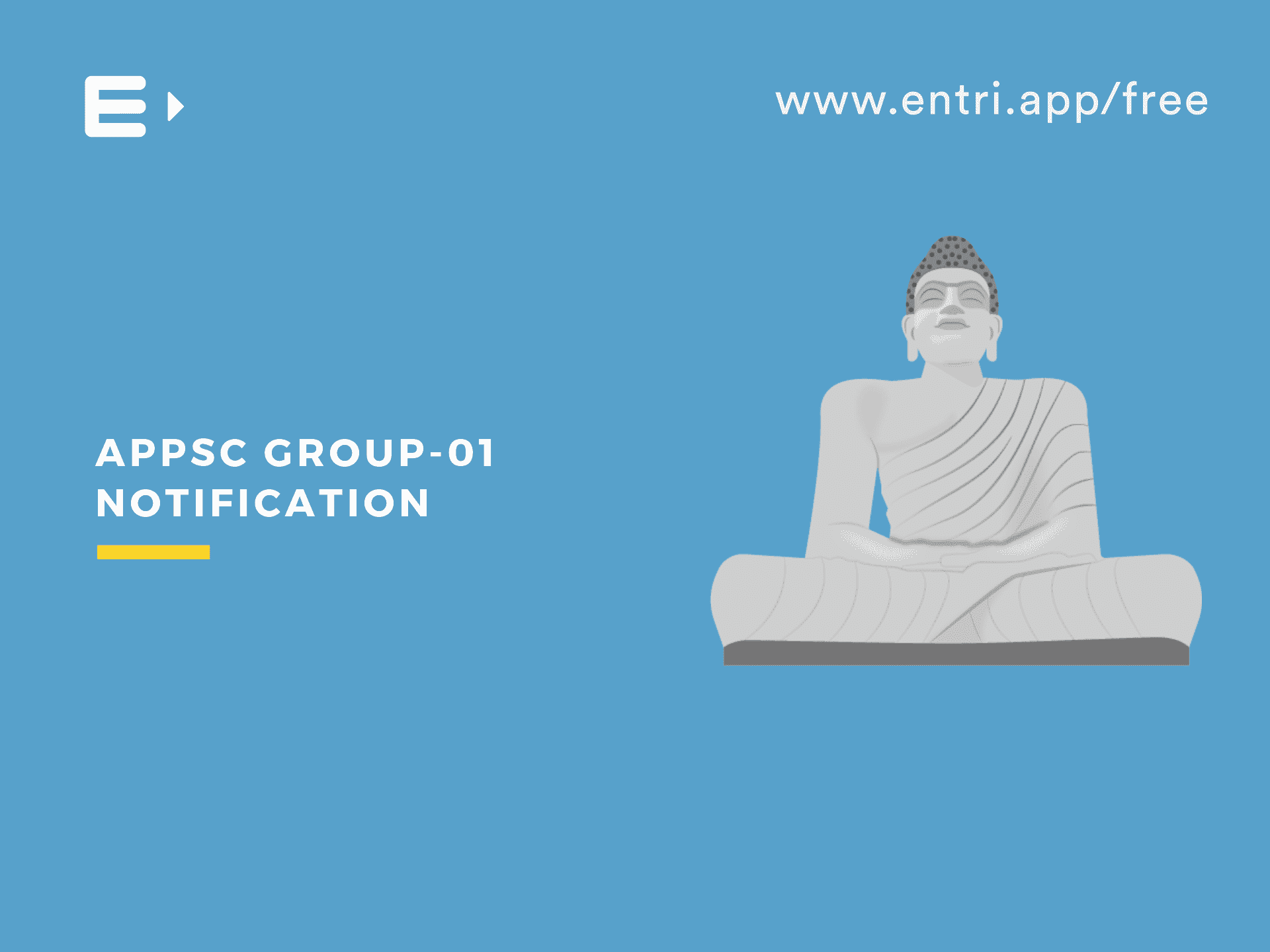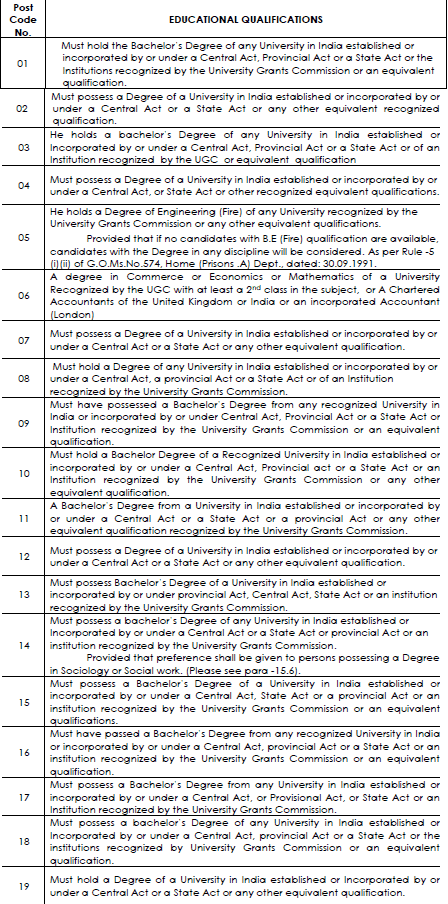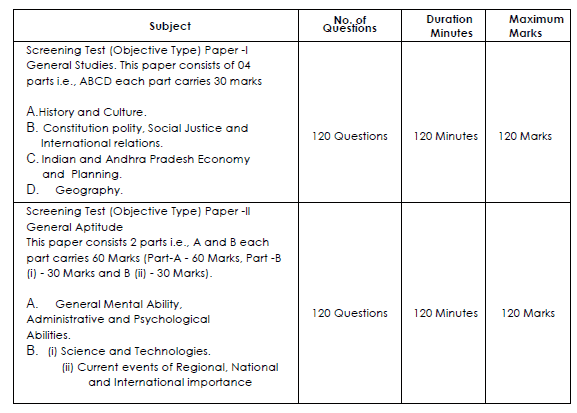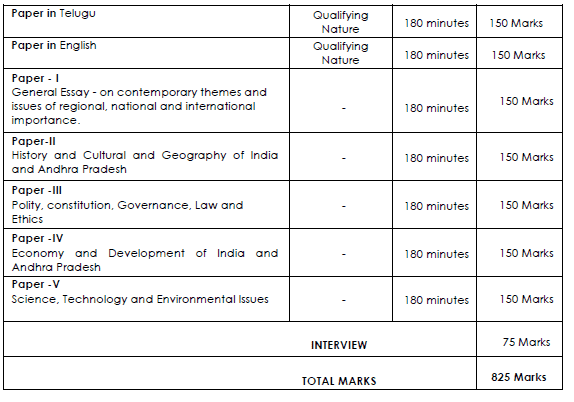Table of Contents
Andra Pradesh Public Service Commission(APPSC) has invited applications from the eligible graduates to the state’s most prestigious APPSC Group-01 2019 service. 169 vacant positions are reported across the state including both fresh vacancies and carry forward ones. Interested candidates should submit their applications through APPSC official website. Here we are bringing you the important aspects of the APPSC Group-01 2019 Notification.
APPSC Group-01 2019 Eligibility
| Post Code Number | Name of the Post | Number of vacancies |
Age as on 01/07/2018 |
Scale of Pay Rs. |
| 01 | Deputy Collectors in A.P. Civil Service |
30 | 18-42 |
40,270-93,780/- |
| 02 | Assistant Commissioner of State Tax in Andhra Pradesh State Tax Services. |
08 | ||
| 03 | Deputy Supdt. of Police (Civil) Cat-2 in A.P. Police Service. |
28 | 21-28 | |
| 04 | Deputy Supdt. of Jails (MEN) in A.P. Jail Service. |
02 | 18-28 | 37,100-91,450/- |
| 05 | District Fire Officers in A.P. Fire Service. |
01 | 21-26 | 37,100-91,450/- |
| 06 | Asst. Treasury Officer/Asst. Accounts Officer in A.P. Treasury & Accounts Service |
13 |
18-42 |
35,120-87,130/- |
| 07 | Regional Transport Officers in A.P. Transport Service. |
05 | 37,100-91,450/- | |
| 08 | Assistant Prohibition & ExciseSuperintendent in A.P. ExciseService. | 11 | 18-26 | 35,120-87,130/- |
| 09 | Mandal Parishad Development Officer in A.P. Panchayat Raj and Rural Development Service. |
48 |
18-42
|
|
| 10 | District Registrars in A.P. Registration Service |
01 | 37,100-91,450/- | |
| 11 | District Employment Officer in A.P. Employment Exchange Service. |
02 | 35,120-87,130/- | |
| 12 | Deputy Registrars in A.P. Cooperative Service |
02 |
37,100-91,450/-
|
|
| 13 | District Tribal Welfare Officer in A.P. Tribal Welfare Service. |
01 | ||
| 14 | District Social Welfare Officer in A.P. Social Welfare Service. |
01 | ||
| 15 | District B.C. Welfare Officer in A.P. B.C. Welfare Service. |
01 | ||
| 16 | District Panchayat Officers in A.P. Panchayat Raj & Rural Development Service. |
01 | ||
| 17 | Municipal Commissioner Grade-II in A.P. Municipal Administration Services. |
01 |
35,120-87,130/
|
|
| 18 | Administrative Officer / Lay Secretary & Treasurer Grade.II in A.P. Medical and Health (Administration) Service. |
06 | ||
| 19 | Assistant Audit Officer in A.P. State Audit Service. |
07 | ||
| Total | 169 |
APPSC Group-01 2019 Education
APPSC Group-01 2019 Exam Pattern
APPSC Group 01 Services selection process includes two stages of written examination followed b the oral interview.
Preliminary Examination
Main Examination
- For every wrong answer, there will be a negative mark of 1/3.
APPSC Group-01 2019 Application Procedure
- The first time applicants for any notification has to first fill the OTPR
application carefully to obtain OTPR ID. Click Here For APPSC website - The candidates have to login into the Commission’s website with the OTPR and the Password set by them.
- Click on the “Online Application Submission” present in the bottom right corner of the Commission’s website.
- Click on the payment link against the Notification Number that he wants to apply.
After the successful, payment reference ID is generated. Applicant should provide the payment reference Id along with the other personal details to complete their application. - Correction in the application form will be enabled for a particular time window.
- Applicant must pay Rs. 250/ towards application processing fee and Rs 120/-towards examination fee. Reservation eligible candidates are exempted from the examination fees.
APPSC Group-01 2019 Exam Syllabus
APPSC Group 01 Exam Syllabus Preliminary Examination
Part 01 General Studies
History and Culture
- Indus Valley Civilization: Features, Sites, Society, Cultural History, Art and Religion. Vedic Age- Mahajanapadas, Religions-Jainism and Buddhism.
- The Maghadas, the Mauryan, Foreign invasions on India and their impact, the Kushans. The Sathavahanas the Sangam Age, the Sungas, the Gupta Empire -their AdministrationSocial, Religious and Economic conditions-Art, Architecture, Literature, Science and Technology.
- The Kanauj and their Contributions, South Indian Dynasties – The Badami Chalukyas, the Eastern Chalukyas, the Rastrakutas, the Kalyani Chalukyas, the Cholas, the Hoyasalas, the Yedavas, the Kakatiyas and the Reddis.
- The Delhi Sultanate, the Vijaynagar Empire and the Mughal Empire, the Bhakti Movement and Sufism – Administration, Economy, Society, Religion, Literature, Arts and Architecture.
- The European Trading companies in India- their struggle for supremacy-with special
reference to Bengal, Bombay, Madras, Mysore, Andhra and Nizam, Governor-Generals
and Viceroys. - Indian War of Independence of 1857 – Origin, Nature, causes, consequences and
significance with special reference to Concerned State, Religious and Social Reform
Movements in the 19th century in India and Concerned State, India’s Freedom Movement, Revolutionaries in India and Abroad. - Mahatma Gandhi, his thoughts, Principles and Philosophy. Important Satyagrahas, the Role of Sardar Patel, Subash Chandrabose in Freedom Movement and Post-independence consolidation. Dr B.R. Ambedkar, his life and contribution to the making of the Indian Constitution, India after Independence – Reorganization of the States in India.
Constitution, Polity, Social Justice and International Relations
- Indian Constitution: Evolution, features, Preamble, Fundamental Rights, Fundamental
Duties, Directive Principles of State Policy, Amendments, Significant Provisions and Basic Structure. - Functions and Responsibilities of the Union and the States, Parliament and State
Legislatures: Structure, Function, Power and Privileges. Issues and challenges pertaining
to Federal Structure: Devolution of Power and Finances up to local levels and
Challenges therein. - Constitutional Authorities: Powers, Functions and Responsibilities – Panchayati Raj –
Public Policy and Governance. - Impact of Liberalization, Privatization and Globalization on Governance – Statutory,
Regulatory and Quasi-judicial bodies. - Rights Issues (Human rights, Women rights, SC/ST rights, Child rights) etc.
- India’s Foreign Policy — International Relations — Important Institutions, Agencies and
Fora, their structure and mandate – Important Policies and Programmes of Central
and State Governments.
Indian and Andra Pradesh Economy and Planning
- Basic characteristics of Indian Economy as a developing economy NITI Ayog and its approach to economic development, Environmental
degradation and challenges – Sustainable Development – Environmental Policy - National Income and its concepts and components
- Indian Agriculture –Irrigation and water – Inputs of agriculture – Agricultural Strategy and Agricultural Policy – Agrarian Crisis and land reforms – Agricultural credit – Minimum Support Prices -Malnutrition and Food Security – Indian Industry – Industrial Policy – Make-in India – Startup and Stand-up programmes – SEZs and Industrial Corridors – Energy and Power policies – Economic Reforms – Liberalisation, Privatisation and Globalization –International Trade and Balance of Payments – India and WTO
- Financial Institutions – RBI and Monetary Policy – Banking and Financial Sector Reforms –Commercial Banks and NPAs – Financial Markets –Instabilities – Stock Exchanges and SEBI –Indian Tax System and Recent changes – GST and its impact on commerce and Industry –Centre, States financial relations- Financial Commissions – Sharing of resources and devolution –Public Debt and Public Expenditure – Fiscal Policy and Budget
- The characteristics/ basic features of Andhra Pradesh economy after bifurcation in 2014
- A.P. Reorganisation Act, 2014 – Economic Issues arising out of bifurcation
Geography
- Earth in Solar system, Motion of the Earth, Concept of time, Season,
Internal Structure of the Earth, Major landforms and their features. Atmosphere-structure and composition, elements and factors of Climate, Airmasses, and Fronts, atmospheric disturbances, climate change. Oceans: Physical, chemical and biological characteristics, Hydrological Disasters, Marine and Continental resources. - Major physical divisions, Earthquakes, landslides, Natural drainage, climatic changes and regions, Monsoon, Natural Vegetation, Parks and Sanctuaries, Major Soil types, Rocks and Minerals.
- Distribution, density, growth, Sex-ratio, Literacy, Occupational Structure, SC and ST Population, Rural-Urban components, Racial, tribal, religious and linguistic groups, urbanization, migration and metropolitan regions.
- Major sectors of the economy, Agriculture, Industry and Services, their salient features.
General Mental and Psychological Abilities
- Logical Reasoning and Analytical Ability.
- Number Series, Coding-Decoding.
- Problems Related to Relations.
- Shapes and their Sub-sections, Venn Diagram.
- Problems based on Clocks, Calendar and Age.
- Number system and order of Magnitude.
- Ratio, proportion and variation.
- Central Tendencies – mean, median, mode — including weighted mean.
- Power and exponent, Square, Square Root, Cube Root, H.C.F. and L.C.M.
- Percentage, Simple and Compound Interest, Profit and loss.
- Time and Work, Time and Distance, Speed and Distance.
- Area and Perimeter of Simple Geometrical Shapes, Volume and Surface Area of Sphere,
Cone, Cylinder, cubes and Cuboids. - Lines, angels and common geometrical figures — properties of transverse and parallel lines, properties of triangles, quadrilateral, rectangle, parallelogram and rhombus.
- Introduction to algebra — BODMAS, simplification of weird symbols.
- Data interpretation, Data Analysis, Data sufficiency, and concepts of Probability.
- Emotional Intelligence: Understanding and analyzing emotions, Dimensions of emotional intelligence, coping with emotions, empathy and coping with stress.
- Social Intelligence, interpersonal skills, Decision making, Critical thinking, problem-solving and Assessment of personality.
Science and Technology
- Nature and Scope of Science & Technology; Relevance of Science & Technology to the day to day life; National Policy on Science, Technology, and Innovation;
- Nature and Scope of ICT; ICT in day to day life; ICT and Industry; ICT and Governance – Various government schemes promoting the use of ICT, E-Governance programmes and services; Netiquettes; Cyber Security Concerns – National Cyber Crime Policy.
- Indian Space Research Organization (ISRO) — it’s activities and achievements; Various Satellite Programmes — Satellites for Telecommunication, Indian Regional Navigation Satellite System (IRNSS), Indian Remote Sensing (IRS) Satellites; Satellites for defence, Eduset or Satellites for academic purposes; Defence Research and Development Organization
- India’s Energy Resources and Dependence, Energy policy of India Government Policies and Programmes. Solar, Wind and Nuclear energy
- Issues and concerns related to the environment; Its legal aspects, policies, and treaties for the protection of environment at the national and the
international level; - Biodiversity- its importance and concerns; Climate Change
- International Initiatives (Policies, Protocols) and India’s commitment
- Forest and Wildlife
- Current Affairs of Regional, National and International Importance
Get Higher Rank on APPSC Group-01 2019 Exam- Download Entri App Now!
APPSC Group 01 Exam Syllabus Main Examination
General English
- Reading Comprehension
- Recognition of Parts of Speech
- Verb forms – Usage of Tenses
- Conditional Sentences
- Identifying and Interchange of Sentences
(Simple, Complex, and Compound) (Active and Passive voice) - Use of Prepositions and Prepositional Phrases
- Articles
- Correction of Sentences
- Use the given Idioms and Phrases in your own Sentences
- One Word Substitutes – Recognition and Usage
- Synonyms and Antonyms– Recognition and Usage
- Expansion of Proverb /Sayings
- Write a Paragraph using the given Words/Phrases
- Summarizing /Precis Writing
- Essay Writing on Topics of Social relevance
- Description of a given Picture/Symbols
- Letter Writing (Informal & Formal)
- Non-Verbal Communication (Body Language)
Paper-I General Essay
Candidate should compulsorily attend 03 Essays one from each section. Each section contains three topics and each Essay carries 50 marks.
- Section-I – Crisis management, Social, Economic and Health Problems,
Analysis and solutions, Conflict Resolution, Decision Making, Ecological
Intelligence. - Section-II – Current events of national and international importance.
- Section-III – Current events relating to the State of Andhra Pradesh
Paper-II
- History and Cultural Heritage Of India
- Social and Cultural History of Andra Pradesh
- The Indian Constitution
Paper- III
- Planning in India and Indian Economy
- Land Reforms and Social Changes in Andra Pradesh post Independence
- Andra Pradesh Economy, Present Status Its Strengths and Weakness
Paper – IV
- Role and Impact of Science and Technology in the Development Of India
- Biological Resources, Human Welfare and Modern Trends in Life Sciences
- Ecology Natural Resources and Environmental Issues
Paper-V
- Data Interpretation and Problem Solving
- Quantitative Aptitude – Number system, Number Sequences,
Series, Averages, Ratio and Proportion, Profit and Loss. - Coding and Decoding problems
- Passage Analysis
Click here to download the APPSC Group-01 Exam Syllabus and Exam Pattern: APPSC Group- 01 2019 Exam Syllabus
APPSC Group-01 2019 Exam Dates
Preliminary Examination
- May 26, 2019
Main Examination
For more details, candidates can download the APPSC Group-01 notification: APPSC Group-01 2019 Official Notification
Entri wishes you all the best for your upcoming Examinations. Start your Preparation today with Entri.
















